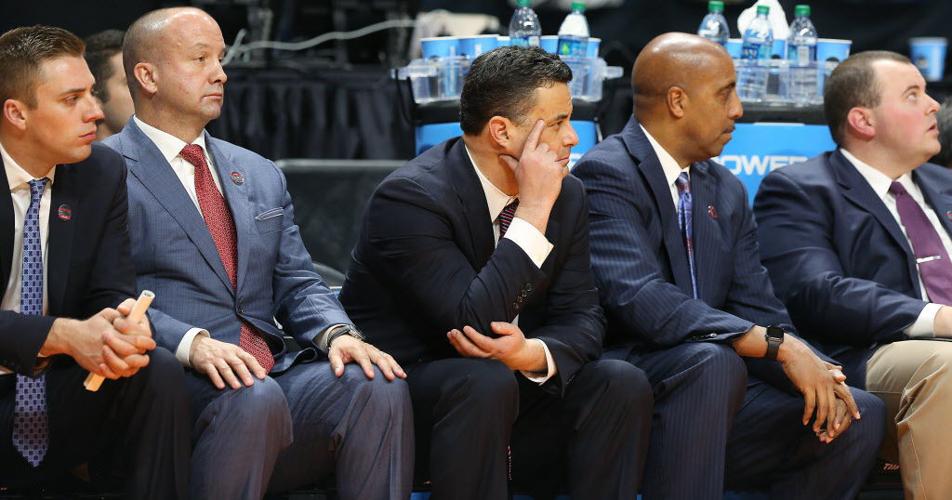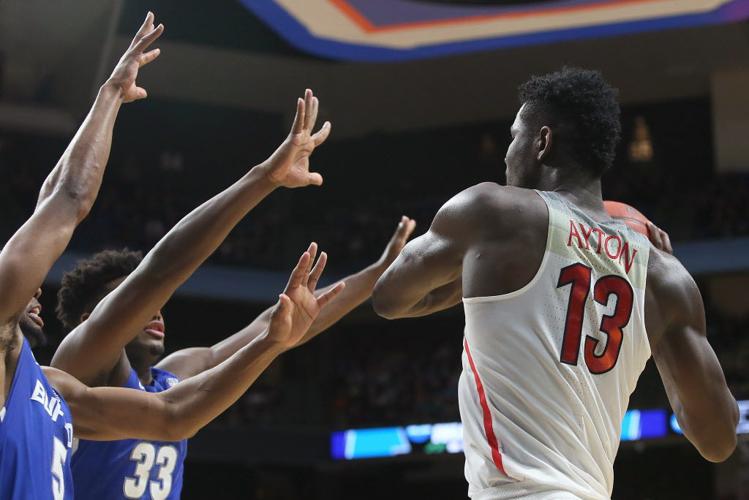BOISE, Idaho — The Arizona Wildcats spent three miserable November days on a place called Paradise Island. Maybe that was a sign.
Arizona recovered from its disastrous 0-3 performance in the Battle 4 Atlantis tournament there well enough to win the Pac-12 regular-season and tournament championships, while Bahamian big man Deandre Ayton bolstered his case to become UA’s first-ever No. 1 NBA draft pick.
But thanks in large part to defensive issues they could never shake, everything else was, well, less than that.
The Wildcats never again regained the stature that had them ranked No. 2 entering the prestigious Bahamas tournament, and they never developed a galvanizing bond that might have formed when dark clouds hovered over their entire season. Not in December, not in January or February and not really even in March.
Their dispirited effort in a 21-point first-round NCAA Tournament loss to Buffalo on Thursday made that clear.
The off-court trouble erupted even before the team’s first official practice. On the morning of Sept. 26, a federal investigation into college basketball resulted in the arrest of UA assistant coach Book Richardson and three other assistant coaches around the country.
Then the dark clouds grew thicker in the late season when the NCAA suspended standout guard Allonzo Trier for a positive PED test that he later appealed out of, and UA coach Sean Miller was the subject of an ESPN report saying he allegedly discussed paying a recruit $100,000.
On the court, things weren’t much better, relative to the Wildcats’ preseason expectations at least. Arizona’s defense wavered from bad to OK to bad again, never establishing the kind of consistency that Miller strives for.
After Miller returned on March 1 when UA officials decided to retain him following his five-day absence, 10 brief days of triumph followed. Miller emphatically denounced ESPN’s report and the media reports that spread it before the Wildcats beat Stanford that day, while UA went on to win the Pac-12 regular-season title two days later, and the Pac-12 Tournament a week after that.
But just five days after the Wildcats cut down nets in Las Vegas, the whole thing came crashing down in the stunning loss to 13th-seeded Buffalo.
Miller, sitting at the postgame interview podium along with seniors Parker Jackson-Cartwright and Dusan Ristic on Thursday night, talked a lot about how good the Bulls were and tried to look at the positive side of it all.
“It’s difficult to exit the tournament the way we have because it doesn’t shed light on a lot of great moments, a lot of the things especially these two guys have fought hard to establish on a season that represented 27 wins and the Pac-12 Tournament, regular season championships,” Miller said. “All that goes away when you lose in the tournament, but in particular lose the way we did.”
The loss was so drastic and so convincing that tears were few.
Ristic and Jackson-Cartwright consoled each other, having poured four years of key contributions into a program in which they became among the four-most winningest UA players ever (Ristic set the record by playing in 115 wins, while Jackson-Cartwright played in 110 wins to tie Kaleb Tarczewski and Matt Muehlebach for second).
They’ll have memories — many of them good ones.
“It’s been special,” Jackson-Cartwright said. “I can keep my head high knowing I played for a great coach who got the absolute best out of me. I had a lot of ups and a lot of downs but this has been one of best times in my life. Playing basketball and just being around good people.”
Rawle Alkins, Allonzo Trier, and even the fiercely competitive Ayton all spoke of good things after their season collapsed, too.
Ayton said his best memory came from before all those wins and the Pac-12 titles, back when the Wildcats began bonding during an exhibition trip to Spain last August. He said he wasn’t nearly as close with his former travel-ball and high school teammates as he became within his UA family.
“I’ve been with great guys, everybody from the managers to the players, I’ve built great relationships,” Ayton said. “Bonding with them was amazing.”
But, somehow, those relationships never really translated on the court.
The Wildcats never could permanently convert all their offensive talent into a sound defensive unit, allowing opponents to shoot better than 49 percent against them on six occasions in the regular season: against North Carolina State, Purdue, UNLV, Colorado (in two regular-season games), and UCLA (at McKale Center). All were losses except the UA’s game at UNLV (which went into overtime) and the one against Colorado at McKale, when the Wildcats compensated by hitting 53.1 percent themselves.
The UA also gave up 47.6 percent shooting in a loss at Washington on Feb. 4, including a game-winning, buzzer-beating 3-pointer by Dominic Green.
Two days after that loss, Miller was still steaming.
“This is my 14th year as a head coach and this is maybe the worst defensive team,” Miller said then. “Every team has its strengths — we certainly have a number of them — and every team has their weaknesses and it’s up to the coach and staff and players to commit towards things that we can improve. And we’re hard at work, I’ll tell you that, at trying to become a better overall more consistent defensive team.”
Having a spread between a top 10 offensive efficiency and a defensive efficiency that hovered around 90 for much of the season put Arizona in a category that college basketball stats guru Ken Pomeroy suggested was trouble.
In a January story he wrote for The Athletic, Pomeroy cited 10 teams since 2007 that ranked in the top 10 of offensive efficiency in midseason, and outside the top 70 in defensive efficiency, a category the 2017-18 Wildcats fit into.
Only three reached the second weekend of the NCAA Tournament, and none made the Final Four.
Arizona didn’t make the second round. The Bulls befuddled the Wildcats offensively and shot 54.8 percent from the field.
The Wildcats never became that consistent defensive team Miller had hoped for, finishing with a thud on Thursday in a game when the Bulls demonstrated much more heart and togetherness.
“We just weren’t playing hard at all,” Ayton said. “After those guys first punched us, it was curtains after that. Their guards really set the tone and then their energy spread.”
That’s why the Wildcats are spending this weekend at home, surrounded by significant questions about the future, with a half-empty roster for next season and the federal investigation still looming.
It’s over, and yet in many ways, it’s not.





